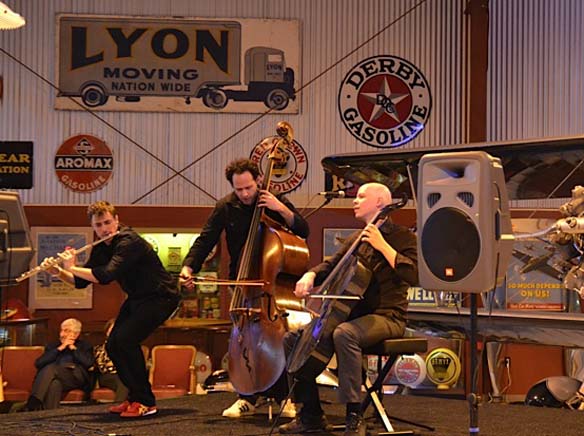It was not the music of Wolfgang Amadeus Mozart in a symphony hall that the renowned Mainly Mozart organization was putting on March 1. It was a departure from their norm, but Mainly Mozart executives and members agreed, Mozart would have enjoyed it. In the Allen Airways Flying Museum at Gillespie Field, among aviation memorabilia and planes from a bygone era, PROJECT Trio played a packed house. The music PROJECT Trio played was progressive, the setting was timeworn, but it was a timeless mix.
It was not the music of Wolfgang Amadeus Mozart in a symphony hall that the renowned Mainly Mozart organization was putting on March 1. It was a departure from their norm, but Mainly Mozart executives and members agreed, Mozart would have enjoyed it. In the Allen Airways Flying Museum at Gillespie Field, among aviation memorabilia and planes from a bygone era, PROJECT Trio played a packed house. The music PROJECT Trio played was progressive, the setting was timeworn, but it was a timeless mix.
After a live auction, PROJECT Trio introduced themselves—they are Greg Pattilo on flute, Eric Stephenson on cello, and Peter Seymour on bass—and got underway with their “new level” chamber music, genres from classical to jazz. Their second piece was an original, upbeat Indian raga. PROJECT Trio is based out of Brooklyn, New York, they were founded in Boulder, Colorado, but they met at the Cleveland Institute of Music. They are modern day masters on their respective instruments as well as available tools of musical distribution. Social media, YouTube in particular with 101,078 subscribers and almost 82 million views, and the Internet have helped gain notoriety. PROJECT Trio’s music has been featured in commercials, on NPR, and Greg Pattillo performed with the “Tonight Show” orchestra, showing then host Jay Leno the unique beat box style of playing the flute which gives an unexpected dynamic quality to whatever PROJECT Trio composes and plays. Pattillo’s flute and onstage presence energize the music. Mainly Mozart members were enrapt.
“Mozart was ground breaking, so why wouldn’t this be? Three classically trained musicians, who choose to play in a highly different way, including a flute player who plays by beat box, Mozart would think that was perfect. In a way it’s more Mozartian for us than playing classical music, just because of the innovation,” said Nancy Laturno Bojanic, Executive Director for Mainly Mozart.
The idea of what was eventually billed as “Fly Air Amadeus” belonged to Esther Nahama, chair of Club Amadeus.
“The Trio performed for us two years ago, and I was blown away. Because this year is revolutionary with a new conductor, all the programming that’s going on, this had to be something different,” Nahama said.
She contacted Bill Allen of the museum, in hopes of doing something different for the PROJECT Trio event.
“PROJECT Trio, on a Sunday afternoon is really avant-garde. This group is so different than what these people have ever heard, it gives another twist on classical music, and how it can be perceived and enjoyed and how it can still add to your interest,” Nahama said.
In the speeches and conversations among Mozart lovers, there was a clear reverence to Mozart’s reputed irreverence, almost a school of thought that believes artistic genius strays off a beaten path and breaks out into new, hypnotic realms, by purposeful and accidental channels. PROJECT Trio and the music lovers to whom they played came together to experience such art while honoring said innovation. The event also raised funds for Mainly Mozart’s many youth and adult programs, one of which has just been created to include aspiring musicians from Mexico. “Mainly Mozart Binational” taps into the musical common denominator to bridge new classical-loving partnerships between San Diegans and Baja Californians.
When Maestro Michael Francis addressed the audience before PROJECT Trio took the stage, he matter-of-factly referred to Mozart’s knowledge of, and love for, partying. Whatever role Mozart’s personality played in his creativity, Mainly Mozart and their selected performers celebrate his music in a similar, pleasure-seeking manner. Francis alluded to five necessary things to achieve that end; friends, location, good drink, great food, and “music in general.” What is a party, what is history, what is the world, without music?














